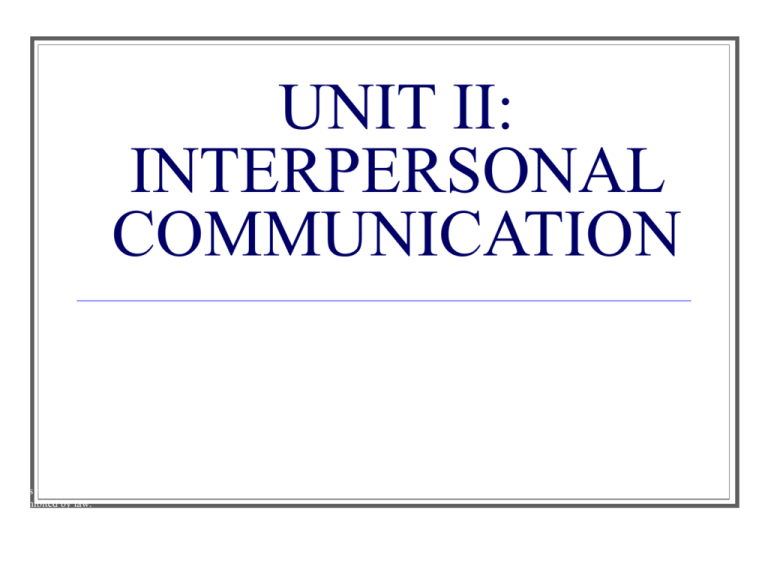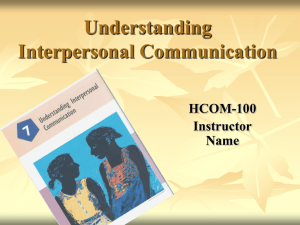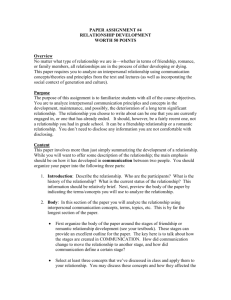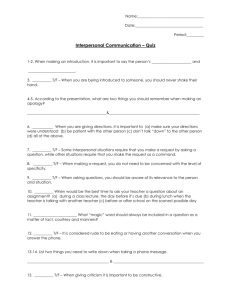Interpersonal Communication
advertisement

UNIT II: INTERPERSONAL COMMUNICATION This multimedia product and its contents are protected under copyright law. The following are prohibited by law: •any public performance or display, including transmission of any image over a network; •preparation of any derivative work, including the extraction, in whole or in part, of any images; •any rental, lease, or lending of the program. Chapter 7 Understanding Interpersonal Communication in Relationships Marital Problems Managing Conflict Communication Principles Appropriately adapt your message to others Listen and respond thoughtfully to others Be aware of your communication Effectively use and interpret nonverbal messages Effectively use and interpret verbal messages Understanding Interpersonal Communication What Is Interpersonal Communication? Initiating Relationships Maintaining Relationships Through Interpersonal Communication Chapter 7: Understanding Interpersonal Communication What Is Interpersonal Communication? Interpersonal communication is a special form of unmediated human communication that occurs when we interact simultaneously with another person and attempt to mutually influence each other, usually for the purpose of managing relationships. Chapter 7: Understanding Interpersonal Communication What Is Interpersonal Communication? IPC involves quality. impersonal communication IPC involves simultaneous interaction between individuals. IPC involves mutual influence between individuals. IPC is the fundamental means we use to manage our relationships. IMPERSONAL COMMUNICATION Chapter 7: Understanding Interpersonal Communication Initiating Relationships Interpersonal Attraction Defined Short-Term Initial Attraction degree to which you desire to form or maintain an IP relationship potential for development Long-Term Maintenance Attraction sustains relationships Chapter 7: Understanding Interpersonal Communication Elements of IP Attraction Similarity Physical and Sexual Attraction Proximity Complementarity inclusion control affection Chapter 7: Understanding Interpersonal Communication Communicating Our Attraction Direct and Indirect Strategies Immediacy Verbal and Nonverbal Cues Getting That First Conversation Going Reducing Uncertainty uncertainty reduction theory passive, active, interactive strategies Getting That First Conversation Going What Do You Say First? The Art and Skill of Asking Great Questions conversational narcissism/self-absorbed communicator style The Art and Skill of Giving and Receiving Compliments Chapter 7: Understanding Interpersonal Communication Maintaining Relationships Through IPC Self-Disclosure Defined we voluntarily provide information to others that they would not learn if we did not tell them Reciprocity in Self-Disclosure Appropriateness in Self-Disclosure Assessing the Risks of Self-Disclosure Self-Disclosure, Intimacy, and Gender Chapter 7: Understanding Interpersonal Communication Models of Self-Disclosure Social Penetration developed by Irwin Altman and Dalmas Taylor illustrates how much and what kind of information we reveal in various stages of relationships circles represent breadth and depth of penetration each relationship represents a degree of social penetration Chapter 7: Understanding Interpersonal Communication Models of Self-Disclosure The Social Penetration Model Early in a relationship Very Intimate Intimate As the relationship develops Very Intimate Superficial Chapter 7: Understanding Interpersonal Communication Models of Self-Disclosure Johari Window reflects various stages of relational development, degrees of self-awareness, and others’ perceptions of us square window represents yourself the self encompasses everything about you, including things you don’t realize Models of Self-Disclosure The Johari Window Model Known to Self Not Known to Self OPEN BLIND Known to Others Not Known to Others HIDDEN UNKNOWN Checking Out Our Interpersonal Hunches




